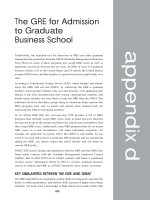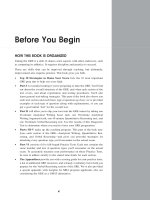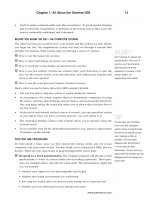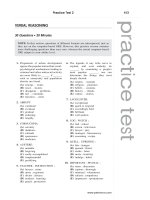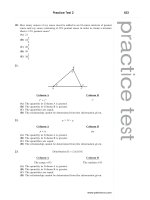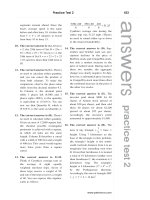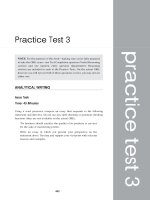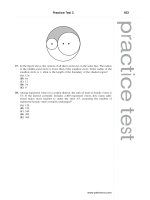Tài liệu Master the Gre 2010 - Part 5 ppt
Bạn đang xem bản rút gọn của tài liệu. Xem và tải ngay bản đầy đủ của tài liệu tại đây (52.05 KB, 10 trang )
Repeating the Test
ETS does not impose any limit on the total number of times an individual may take the
GRE. However, no test taker may take the computer-based GRE and/or the paper-based
GRE more than once in the same calendar month or more than five times within any
12-month period. These restrictions apply regardless of whether test scores are later
canceled and regardless of testing location(s)—United States, Canada, or elsewhere in
the world.
Canceling or Rescheduling a Test Date, and Fee Refunds
Test takers in the United States, Guam, U.S. Virgin Islands, Puerto Rico, and Canada
can cancel a test appointment or reschedule the time, date, or location either online (at
www.prometric.com) or by calling 1-800-GRE-CALL or 1-443-751-4820. CBT test takers
elsewhere in the world must contact the appropriate RRC to cancel or reschedule. (For
RRC contact information, see “GRE Availability and Registration [International Test-
ing]” earlier in this chapter.)
Registrants who cancel or reschedule no later than three full days before their test
date (not including the test date) are entitled to a refund of one-half their original test
fee; registrants who wait any longer to cancel or reschedule forfeit their entire test fee.
Also, ETS charges a $50 fee to reschedule a test appointment.
For cancellation and rescheduling policies regarding the paper-based test, see the
current GRE Bulletin.
Fees for the GRE and for Related Services
The fees listed below are for the 2008–09 testing year, in U.S. dollars. Note that fees for
the GRE General Test are likely to increase for the 2009–10 testing year and beyond.
(Not all GRE-related fees are listed here; see the GRE Bulletin for a complete list.)
• $140 for the GRE General Test in the United States, U.S. Territories, or Puerto
Rico
• $190 for the GRE General Test in China (including Hong Kong), Korea, or Taiwan
• $170 for the GRE General Test in any other international location
• $25 for late registration
• $50 for rescheduling or changing test location
• $20 for each additional score report (ASR) request
Fee Reduction Program
During each testing year, a 50% reduction in the GRE test fee is available to a limited
number of GRE registrants on a first-come, first-served basis. To be eligible for the fee
reduction, a registrant must be:
• a U.S. citizen or resident alien, and
• a college senior or unenrolled college graduate.
Chapter 1: All About the General GRE 23
.................................................................
..............................................................................................
www.petersons.com
Registrants must also meet certain financial-need requirements. To receive the fee
reduction, you must ask your college financial aid office to affirm your eligibility by
issuing a fee reduction certificate, which you can then apply to the General Test
and/or one Subject Test. Submit the original certificate (not a photocopy) as directed to
ETS; allow about three weeks for ETS to process the certificate. The fee reduction
program is available for eligible individuals strictly on a one-time basis.
Test Takers with Disabilities
The following types of nonstandard testing accommodations are available to eligible
GRE test takers:
• Special keyboards and mouse devices, screen magnification, special screen colors
(for computer-based testing)
• Braille or large print paper-based testing (with or without audio)
• Extended testing time and/or break times
• Assistance from readers, writers, and interpreters
Minor accommodations (e.g., additional breaks, adjustable chairs, or special lighting)
are also available to test takers with documented medical conditions (for example,
those with chronic pain, diabetes, or epilepsy).
To secure nonstandard accommodations, complete and submit to ETS a “Request for
Non-Standard Testing Accommodations” form. You can download the form from the
ETS Web site or contact ETS Disability Services (see below) for a copy. If your request
is approved, ETS will mail you an authorization voucher. Allow six weeks for ETS to
process your request.
You’ll need a special number that appears on your voucher to register for the test
under the accommodations you’ve requested. Note that test takers requesting non-
standard testing accommodations must register for the GRE by mail rather than
online or by telephone.
For additional information and instructions, see the Bulletin Supplement for Test
Takers With Disabilities, available for download at the ETS Web site or by contacting
ETS Disability Services. This supplement also includes the request form, which
consists of a three-part application.
For more details and for the latest updates, or to obtain the request form or the
current Bulletin Supplement, contact ETS Disability Services (information provided
below).
Web
www.ets.org/disability
Telephone
1-866-387-8602 (toll-free for test takers within the United States, U.S. Territories,
and Canada)
1-609-771-7780 (all other locations)
Monday–Friday 8:00
A
.
M
.to5:00
P
.
M
. Eastern Time
PART I: GRE Basics24
.................................................................
..............................................................................................
www.petersons.com
TTY
1-609-771-7714
Fax
1-609-771-7165
ETS Disability Services
Educational Testing Service
P.O. Box 6054
Princeton, NJ 08541-6054
THE GRE PERSONAL POTENTIAL INDEX (NEW IN 2009)
Starting in July 2009, a new measure called the Personal Potential Index (PPI) is
available to all GRE General Test registrants. The PPI was designed by ETS to provide
a quantitative assessment of non-cognitive personal attributes that the GRE test itself
was never intended to measure and that serve as predictive indicators of effectiveness
and persistence in graduate-level study. The PPI is not part of the GRE that you take on
test day. Rather, it is essentially a means of standardizing one element of the admissions
application: the letter of recommendation, or “rec letter.”
Here you’ll learn about the PPI index and rating system. You’ll also learn how
graduate schools are expected to use the PPI and how you, as an applicant, can make
use of it.
The PPI Questionnaire
As a candidate for admission, you initiate the PPI process by asking up to five evaluators
to complete an online PPI questionnaire aimed at assessing you, the applicant, in terms
of the following six attributes, or “dimensions”:
• your knowledge and creativity
• your communication skills
• your ability to work as part of a team
• your resilience
• your planning and organization abilities
• your ethics and integrity
The PPI questionnaire includes four questions for each of the six attributes listed
above (24 questions in all). Notice that the six attributes have more to do with
noncognitive attributes than with intellectual capacity or academic accomplishment.
Also note that in developing the PPI, ETS recognized that an evaluator may not be
familiar with the specific academic program to which an applicant is applying. Accord-
ingly, the PPI does not ask the evaluator to comment on the applicant’s suitability for
any particular academic program.
Chapter 1: All About the General GRE 25
.................................................................
..............................................................................................
www.petersons.com
Evaluators respond to each question by comparing you with other individuals they
have known and who have applied for graduate admission in the same field of study,
and then rate you accordingly on the following 1–5 scale:
Below average
Average
Above average
Outstanding (top 5%)
Truly exceptional (top 1%)
Evaluators may also elaborate on their answers by providing a narrative response to
any specific PPI question. They may provide general comments as an overall evalu-
ation as well. After tabulating and averaging the ratings provided by all your evalu-
ators, ETS reports the results to the schools as you, the applicant, direct. The PPI
evaluation report includes the following information:
• the mean (average) rating by each evaluator for each of the six attributes
• the mean of all evaluators’ ratings for each of the six attributes
• each evaluator’s overall mean and the overall mean for all evaluators
• individual answers (including narrative responses) provided by each evaluator
• name and contact information of each evaluator
You can track the status of your PPI evaluations and evaluation report throughout the
entire process.
The PPI and Graduate School Policies
As noted earlier, the function of the Personal Potential Index is similar to that of
traditional letters of recommendation. But this doesn’t mean that all graduate schools
will immediately abandon their own rec-letter forms in favor of the PPI questionnaire.
Remember that the PPI is new in 2009. Although many schools will embrace the new
system as a way for applicants to supplement their recommendation letters, fewer
schools are likely to replace their own recommendation letters entirely with a standard-
ized form—at least not for a while. In any event, contact the specific graduate programs
that interest you to determine their current policies.
How the PPI Can Help You, the Applicant
Let’s assume that the PPI is not required for admission to your target graduate
programs. Does that mean it is of no use to you? Not necessarily. Traditional recommen-
dation letters from professors may suffice for applicants with distinguished academic
records. But if your strengths lie more in the personal attributes that the PPI measures
than in your GPA, then the PPI might very well help make you a more attractive
candidate to graduate programs. By the same token, if you have a strong academic
record, you can use the PPI to show the admissions committee that you possess not only
the “book smarts,” but also the character they’re looking for to round out their student
body.
PART I: GRE Basics26
.................................................................
..............................................................................................
NOTE
Evaluators complete the PPI
online and submit it
electronically. According to
ETS, evaluators spend an
average of less than 15
minutes completing the PPI
questionnaire.
www.petersons.com
PPI Fee Policies
Effective July 2009, the PPI is bundled with the GRE General Test. This means that by
registering for the test itself, you can access the PPI, at your option, without paying an
additional fee. (The costs of administering the PPI are reflected in a 2009 fee increase for
all test takers.)
At no additional charge, you can designate up to four institutions to receive a PPI
evaluation report once the evaluations have been completed. ETS charges a small fee
for each additional institution beyond four that you designate to receive an evaluation
report.
You can purchase the PPI as a stand-alone assessment as well—so if you took the
GRE before July 2009 and don’t need or want to repeat the test, or if you’re applying
for admission to a program that does not require GRE test scores but nevertheless
requires the PPI, you won’t need to pay the full GRE registration fee just to access the
PPI.
OBTAINING UP-TO-DATE GRE INFORMATION
The registration, testing, and other information in this chapter highlights ETS’s
policies and procedures, but it is not intended to be comprehensive. For complete
information, consult the official GRE Web site (www.gre.org) or refer to the printed GRE
Information and Registration Bulletin, published annually by ETS. This free bulletin is
available directly from ETS and also through career-planning offices at most four-year
colleges and universities. You can also download the Bulletin from the official GRE Web
site. The Bulletin provides detailed, current information about:
• the CBT test format
• registration methods and procedures
• fees for registration and related services (fee amounts, preferred methods and
currencies, and so on)
• accommodations for test takers with disabilities
• canceling or rescheduling a test date/refund policies
• ID requirements for admission to the test center
• canceling scores and score reinstatement
• repeating the test
• test center regulations and testing procedures
• test centers and RRC centers (codes, locations, telephone numbers, hours of
operation)
• the paper-based GRE (availability, registration procedures, standby testing, and
so on)
• scores and score reporting (additional score reports, phone services for scores, and
so on)
• the GRE Search Service (this service matches applicants with graduate pro-
grams)
Chapter 1: All About the General GRE 27
.................................................................
..............................................................................................
TIP
It’s perfectly okay for the same
individuals writing your “rec
letters” to provide your PPI
ratings as well. But try to find at
least one different person for
the PPI -- perhaps an
employer, supervisor, or mentor
who knows you outside the
context of academia.
NOTE
The Bulletin also provides
registration information for the
GRE Subject Tests, as well as a
description of each one.
www.petersons.com
